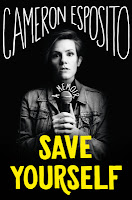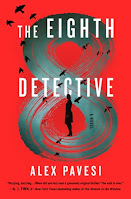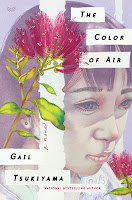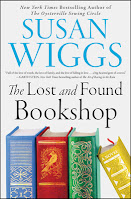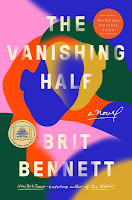Kay stays on top of her staff recommendations, both her ever-rotating shelf of favorites here at the store and her virtual shelf on the Boswell website (check that out here) - she's one of our most voracious readers and her taste brings us some of the most wide-ranging recommendations. As she says on that staff rec page: Kay’s go-to is science fiction, but she often dips into off-beat (i.e. dark) fiction, and both fiction and non-fiction about nature, the environment, art, gardening, adventure, and unusual minds. I can vouch for all of this! So let's get to her picks.
#1 Florida Man by Tom Cooper. I'm not sure it's possible to overstate how much Kay loved this book - I've heard her telling person after person about it - and I also don't think I've ever heard her talk about it without laughing out loud at it again. It's that good. Here's what her rec says about it: "An amazing stroke of good luck followed by years of miscues - often attributable to procrastination - mess with Reed's life on the west coast of Florida, where he runs a barely surviving jungle tour and a small hotel. Add odd locals, a few rescued migrants, and an over-the-top crazed assassin, and you get a story filled with adventure, a touch of madness, and some very endearing moments. Take an unforgettable, vicarious vacation in Florida with Reed, aka Florida Man. Lifetime memories pretty much guaranteed."
#2 Highfire by Eoin Colfer. Here's another one I've overheard Kay recommending a lot to folks while laughing. Indeed, she's making more guarantees in this staff rec: "Colfer mixes poverty, mystery, crime, hilarity, and heart in this one-of-a-kind book set in the Louisiana bayou. Don’t let Vern, the Netflix addicted, vodka drinking, dragon keep you from reading this gem that’s mostly a tale about good versus evil. I promise you’ll close this book with a smile."
#3 Kay is the second bookseller, along with Jenny, to put Oona Out of Order by Margarita Montimore on her list. That's right, we've got a double rec here, folks. Kay says, "Imagine living your adult life never knowing how old you’ll be when you wake up on your next birthday. This is Oona’s life, starting with what should be her 19th birthday, when she wakes up 51 years old. Before the book ends, she flips through seven more birthdays, ranging from 19 to 53. Oona’s reactions to this craziness, such as attempts to adjust her fate and to right past wrongs, feel surprisingly believable. This is a unique, fun, and thought-provoking book."
#4 Leave the World Behind, the National Book Award Finalist by Rumaan Alam. We had a few good reads on this one at the store, including myself and (I believe, she'll tell me if I'm misremembering) Jen. But Kay was the one who elevated it to Top 5 status. From her staff rec: "Two very different families reluctantly agree to temporarily share a remote Long Island house owned by one of the families. Over the course of three days, all six individuals encounter odd phenomena, usually while alone. Eventually, they all are well-aware that something strange is happening, but no one can articulate what it is. Rumaan's portrayal of a world suddenly turned upside down, and his characters' unfolding reactions to it, are unsettlingly credible."
#5 Kay leaves the fiction world behind for her final pick: The Reign of Wolf 21: The Saga of Yellowstone's Legendary Druid Pack by Rick McIntyre. I know Kay loved McIntyre's precursor to this book (it may have been in her Top 5 pick in a year past, though again, that's based upon a vague recollection, so Kay, correct me if I'm wrong) and says of this follow-up: "I was skeptical that McIntyre could write a second book as beguiling and insightful as his first about the wolves reintroduced to Yellowstone. Wow, was I wrong. This book is equally captivating as The Rise of Wolf 8 (which you must read before 21). "
Onto Margaret, who once said to me, "oh I just don't read that many books." And then turned in a list full of surprises, including things I didn't realize she'd read. Not that I keep a running tally of every book that every Boswellian ever picks up (that would fully tap out whatever is left of my memory, anyway), but it's always cool to see surprises on these lists, especially surprises like "whoa you read way more stuff than you made us all think you did."
#1 on the Margaret list is We Ride Upon Sticks by Quan Barry. This book got a lot of love when it came out early in the year, and for good reason. Margaret calls it "an empowering tribute to the decade of the ‘80s, girlhood, and women of all sorts. The story follows the 1989 varsity girls field hockey team of Danvers High, ready to start another season after an impressively long losing streak. This time, however, they are going to do whatever it takes to get to States - even if it means following in the footsteps of those teen girls that lived in their town three centuries ago by dabbling in a bit of witchcraft. Told from the point of view of all the girls at once with the collective ‘We,’ Barry introduces us to each of these teen girls that signed their name in the devil’s book (which is actually just a spiral notebook with Emilio Estevez on the cover), giving us their hopes, struggles, and reasons for turning to darkness. Except, are dark forces really at work here? Or is it just the ever-constant, ever-changing ordeal of being a woman? Barry expertly weaves a tale with big hair, outrageous fashion, and rocking music without being over-the-top cheesy, giving us a story that every girl and woman has lived through while at the same time being entirely unique."
#2 Such a Fun Age by Kiley Reid. This one was an instant NYTimes bestseller and, along with We Ride Upon Sticks, also made our Gift Guide this year (check it out right here online, if you haven't yet during these posts, what are you waiting for, last chance, better click here now!) and has more than one fan at the store. In fact, most of Margaret's top 5 picks have more than one fan at the store, which must mean that if Margaret likes it, you know lots of people are going to. Which brings me to -
 #3 The Lost Book of Adana Moreau by Michael Zapata, a book that I absolutely loved and (not to pat myself of the back or anything, but) encouraged Margaret to read because I thought it was just the kind of story-about-stories that she might like. And so I was thrilled to see it on her list this year. She says, "A little bit of sci-fi, a little bit of history, and a lot of love for stories is what makes The Lost Book of Adana Moreau a truly amazing novel. Zapata weaves a tale of intertwining lives, from New Orleans to Argentina to Israel to Russia and back, all centered around the people that brought Adana Moreau’s words to life. Zapata skillfully bounces back and forth between the stories of two men and everyone they come in contact with, showcasing a wide variety of refugees and people, without making the narrative overwhelming and confusing. He pays tribute to science fiction and quantum physics by touching on the vast amounts of universes found right in front of us; everyone has a story to tell, everyone is a parallel universe unto themselves, and history is only relative to those that still remember." And guess what - Jen is a fan, too!
#3 The Lost Book of Adana Moreau by Michael Zapata, a book that I absolutely loved and (not to pat myself of the back or anything, but) encouraged Margaret to read because I thought it was just the kind of story-about-stories that she might like. And so I was thrilled to see it on her list this year. She says, "A little bit of sci-fi, a little bit of history, and a lot of love for stories is what makes The Lost Book of Adana Moreau a truly amazing novel. Zapata weaves a tale of intertwining lives, from New Orleans to Argentina to Israel to Russia and back, all centered around the people that brought Adana Moreau’s words to life. Zapata skillfully bounces back and forth between the stories of two men and everyone they come in contact with, showcasing a wide variety of refugees and people, without making the narrative overwhelming and confusing. He pays tribute to science fiction and quantum physics by touching on the vast amounts of universes found right in front of us; everyone has a story to tell, everyone is a parallel universe unto themselves, and history is only relative to those that still remember." And guess what - Jen is a fan, too!#4 Hench by Natalie Zina Walschots. The trend continues - indeed, if you've been following these blog posts faithfully, then first of all, thank you, and second of all, you know that Hench also made Jen's top 5 this year. Indeed, Jen and Margaret, two literary peas in a pod. It's something like The Boys meets My Year of Rest and Relaxation - a smart, imaginative, and evocative novel of love, betrayal, revenge, and redemption, told with razor-sharp wit and affection, in which a young woman discovers the greatest superpower, for good or ill, is a properly executed spreadsheet.
 Margaret goes her own way with her #5 choice: He Must Like You by Danielle Younge-Ullman. Margaret says it's "a stunning YA novel about sex, sexual harassment, power, and realizing when enough is enough. Libby is our high school senior heroine, dealing with harassment in more points of her life than she thinks. Her father, an astoundingly aggressive and selfish man bulldozing over the family, drops the double bomb on Libby that a) he spent all her college money, and b) he is going to turn their house into a B&B, making Libby homeless in six months. Suddenly, Libby is trading dreams of college for a waitress job. She's also crushing hard on her best friend Noah, but her past hookups keeping interrupting their possible romance in her memories and flashbacks. And were those past hookups even consensual? It's no wonder that, when one of the gross customers gets a little too handsy, Libby snaps. Too bad that man she just dumped a pitcher of sangria on has half the town in his pocket, and someone was filming. Will Libby crumble under the pressure coming from all sides of her life, or will she rise to the occasion and finally stand up for herself to her friends, family, and the whole community? Taking place over the course of a week, He Must Like You shows a wonderfully real take on passive harassment, dubious consent, and straight-up jerks that women and teenage girls deal with all the time, without being too dark. A must-read for everyone!"
Margaret goes her own way with her #5 choice: He Must Like You by Danielle Younge-Ullman. Margaret says it's "a stunning YA novel about sex, sexual harassment, power, and realizing when enough is enough. Libby is our high school senior heroine, dealing with harassment in more points of her life than she thinks. Her father, an astoundingly aggressive and selfish man bulldozing over the family, drops the double bomb on Libby that a) he spent all her college money, and b) he is going to turn their house into a B&B, making Libby homeless in six months. Suddenly, Libby is trading dreams of college for a waitress job. She's also crushing hard on her best friend Noah, but her past hookups keeping interrupting their possible romance in her memories and flashbacks. And were those past hookups even consensual? It's no wonder that, when one of the gross customers gets a little too handsy, Libby snaps. Too bad that man she just dumped a pitcher of sangria on has half the town in his pocket, and someone was filming. Will Libby crumble under the pressure coming from all sides of her life, or will she rise to the occasion and finally stand up for herself to her friends, family, and the whole community? Taking place over the course of a week, He Must Like You shows a wonderfully real take on passive harassment, dubious consent, and straight-up jerks that women and teenage girls deal with all the time, without being too dark. A must-read for everyone!"And finally, the last Boswellian of all the top 5 posts - ME! As you know now, this is Chris, compiling and offering what I hope are are some helpful notes for all my fellow Boswellians' choices. And I've saved what (I think are) the best books of the year for last. Let's be honest - my taste hovers pretty much smack in the middle of the world of literary fiction. Not that I'm a total snob about it or anything, though you will note I'm the only person with a (gasp!) short story collection on my list. I kid, and I'll also be the first to tell you that 'literary' really is just another genre on the shelves. When it comes down to it, what I'm always looking for are books that make me feel a bunch of feelings and think a bunch of thoughts. Perhaps you, too, will find one of these books does that for you.
If you read our newsletter or any other of the Boswell communications, you might know that #1 on my list is The Knockout Queen by Rufi Thorpe. We're doing a virtual event in which I'll chat with her this coming Wed, 12/2 (click here to register) that you might know about, too. This is one of the books on my list that is so jaw-droppingly good I had to go back and read all of her other books. It's is an intimate, articulate, violent book about good and bad people and good and bad things and all of them just happening to each other all the time for no reason except that they can. So much of the novel is about examining morality – how do you judge a person’s moment at the edge, how do you put it into context? – but those questions are put into sharp relief when juxtaposed against the book’s numbing understanding (is this the new nihilism?) that no matter what they do, this generation is going to end up worse off than the one before them. Does it even matter if their futures are dashed? What’s left are a couple of kids clinging to each other to whom Thorpe gives the enviable, pitiable, beautiful, and ugly depth of real, living, breathing human beings. Are they moral? Who cares - they are ALIVE.
#2 Broken People by Sam Lansky. This is the other book that so knocked me out that I had to read everything else the author had written (easier in this case, as Lanksy's only published one other book, the memoir The Gilded Razor, though I'm definitely looking forward to whatever comes next from him). Lansky’s novel is rangy, searching, and razor-sharply self-critical autofiction about Sam, a (self-described) broken young writer desperate to be healed via a weekend ayahuasca trip led by a bougie middle-aged white guy shaman who promises (then spends the whole book infuriatingly, hilariously hedging) to fix everything that’s wrong in three days or less. Lansky’s sickness is a symptom and a symbol; a cultural signifier, a self-manifested punishment, and simple bad luck. Sam relives layers of memory (particularly his relationships and sexual history, his sobriety and identify as an addict) rediscovering and recontextualizing the stories he tells as an act of self-definition. And so what if, at the end of three days, Sam isn’t fixed? Lansky makes this question feel breathtakingly, viscerally life-or-death until, beautifully, it isn’t, and the real question emerges: can a broken person accept that he doesn’t need to be fixed?
#3 is that story collection I warned you of: Cool for America by Andrew Martin. Once again, I read this and immediately snagged a copy of Martin's novel, Early Work, which is at the top of my to-be-read pile. And look, absolutely nothing about this book should work or appeal to anyone. It's a book of stories about a bunch of lost millennials, for god's sake, who move back and forth between Missoula, MT and the cities and their exurban territories of the East Coast. These are people beginning to understand that their lives of diminishing expectations and returns are just going to keep happening to them, and maybe they can do something about it, but even their best intentions may not improve matters. It’s also streaked through with people feeling just plain old alone. But don’t worry, because it’s also pretty funny, and not in the dumb, goofy “check out this zany idea” way so many contemporary short stories rely on for funny. There are moments of real compassion, connection, and tenderness, made all the more precious by how impossible those things can seem in the so-real world that Martin writes. Most of all, these stories have something I’ve been wishing for in book after book of recent short stories: real, honest-to-god, emotionally resonant, capital-E endings, something that so many lesser writers, especially with material like this, will just gesture toward at best. But not Martin – he sticks landing after landing. There’s just nothing else to say except: these are really great stories.
#4 leaves fiction land for a walk through the land of satirical essays that take oh so necessary pot shots at the monsters and rubes currently in charge of the country: Nothing Is Wrong and Here Is Why by Alexandra Petri. Petri glares into maw of the American abyss, and the abyss stares back, but then Petri smirks, and the abyss kinda chuckles, and everybody says, aw, jeez, and gets to have a laugh at our horrible, horrible mess. If good comics punch up, then Petri is firing a bazooka at the sky, blowing up the bad faith charlatans in charge with a direct and deviously brilliant trick: asking you realize just how baldly, absurdly evil the president and his sycophants are if you take them and their lies at face value. Petri doesn’t flinch in the only book about politics this year worth the time it takes to read. Standing ovation.
#5 returns us to fiction land - specifically, an entry into my favorite genre: The Great American Novel. Yes, really. Homeland Elegies by Ayad Akhtar. Ron Charles, my favorite book critic, already called the Pulitzer shot for Akhtar in his review. I'll add on: Certainly it’s one of the boldest books on existing in this country post-9/11. Not since Exley’s A Fan’s Notes (and those in the know will know what I mean) can I recall a novel in which a writer was so unashamed to expose the ugliest parts of his country and of himself to create a portrait of an American living in, with, and against America. It’s about how history, geography, education, economics, medicine, and yes, Donald Trump, put a father and son at odds with each other, with themselves, and with their country. Most of all, it is an exhaustive examination of that most base, central question in a time when it’s most needed - what is to be an American? This novel is astounding.
And that's all she wrote. Thanks for following along this year with our favorites. I hope you found a new book or two to try along the way, and maybe had some of your own biases confirmed about the greatness of a book or two you read this year. And here's to a holiday season of book sharing and a coming new year of reading, too.



















